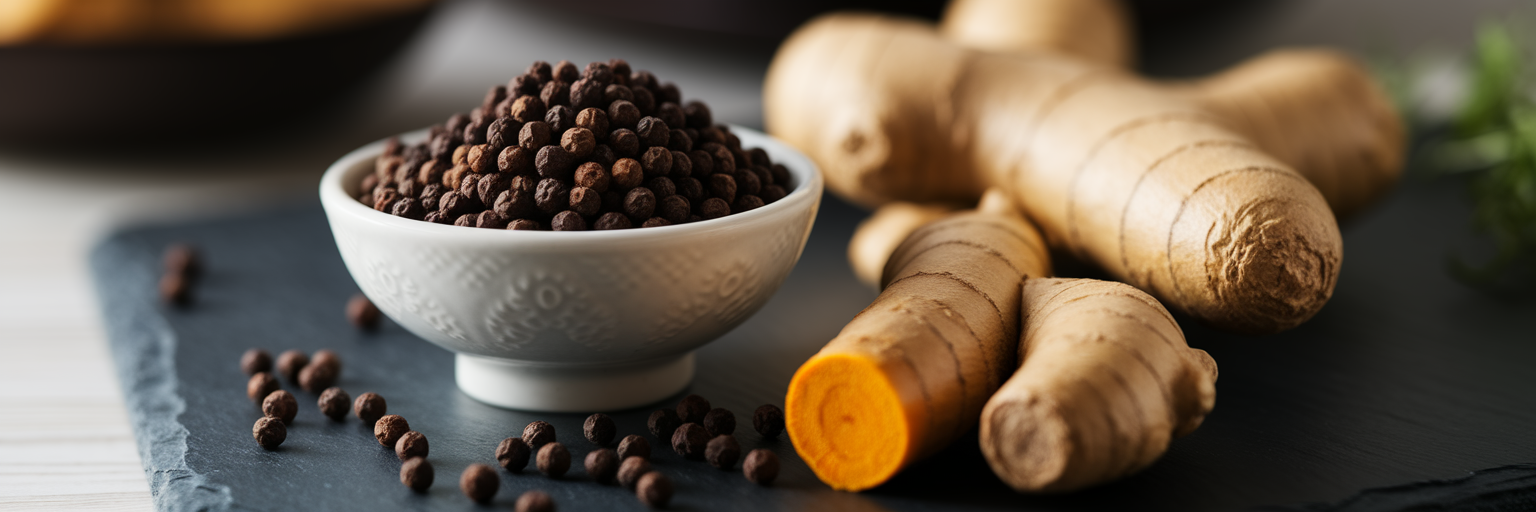The Importance of Protein Bioavailability
A core principle of nutrition is that the protein you consume is only as effective as the amount your body can actually absorb and use. This concept is known as protein bioavailability, and it measures how efficiently your body can utilise a protein source. For those following a plant-based diet, this is a particularly relevant topic. Some plant foods contain compounds like phytates and tannins, which can slightly hinder the absorption of certain nutrients. But this isn't a setback. Instead, it's an opportunity to optimise your diet.
Understanding how to enhance plant protein bioavailability empowers you to get more from every meal. By making small, strategic additions to your plate, you can significantly improve how your body processes plant-based proteins, helping you reach your fitness and wellness goals more effectively. Let's explore some simple, natural ingredients that can make a real difference.
1. Black Pepper for Enhanced Nutrient Uptake

It might just be a common tabletop spice, but black pepper holds a powerful secret for nutrient absorption. The magic comes from its active compound, piperine, which is responsible for its distinct pungent flavour. But piperine for protein absorption does much more than add a kick to your food. It works by stimulating digestive enzymes in the pancreas and supporting the intestinal lining, which allows more amino acids and other nutrients to pass into your bloodstream.
This isn't just theory. As highlighted in a study from the Journal of Agricultural and Food Chemistry, piperine has been shown to enhance the bioavailability of various compounds. This scientific backing supports its role in helping your body make the most of the protein you consume. Integrating it is simple:
- Add a pinch of freshly ground black pepper to savoury plant-based meals, like tofu scrambles or by adding it to one of these easy vegan protein recipes you'll actually crave.
- Mix a small amount into a post-workout smoothie to complement your protein powder.
- Sprinkle it over avocado toast or salads for a simple, effective boost.
2. Sprouted Grains and Legumes for Better Digestion
Sprouting, or germination, is a natural process that awakens a seed and unlocks its full nutritional potential. Think of it as pre-digestion that happens before the food even reaches your plate. This transformation offers a powerful one-two punch for improving protein absorption. First, sprouting significantly reduces anti-nutrients like phytic acid, which can bind to minerals and proteins, making them less available to your body. Second, the process activates enzymes within the seed that begin breaking down complex proteins into simpler, more easily digestible amino acids.
The sprouted grains protein benefits are clear: your body has to do less work to access the nutrients. Research confirms that sprouted grains and legumes have higher amino acid bioavailability compared to their unsprouted counterparts. You can easily incorporate them by choosing sprouted grain bread for your sandwiches, adding sprouted lentils to salads, or using sprouted mung beans in stir-fries. For more insights on optimising your nutrition, our blog offers a wealth of information.
| Factor | Unsprouted Grains/Legumes | Sprouted Grains/Legumes |
|---|---|---|
| Anti-Nutrient Content | Higher levels of phytic acid and tannins | Significantly reduced levels |
| Protein Digestibility | Complex proteins, harder to digest | Proteins are broken down into simpler amino acids |
| Nutrient Availability | Minerals like zinc and iron may be less available | Increased bioavailability of vitamins and minerals |
| Enzyme Activity | Dormant enzymes | Activated enzymes that aid digestion |
3. Fermented Foods for a Healthy Gut

The health of your gut microbiome is foundational to how well you absorb nutrients from your entire diet. This is where fermented foods like kimchi, sauerkraut, tempeh, and miso become so valuable. These are not just flavourful additions; they are potent sources of probiotics, the beneficial bacteria that support a thriving gut environment. The fermentation process itself is a form of pre-digestion, where these helpful microbes break down complex proteins and anti-nutrients before you even take a bite. This makes them excellent foods that help digest protein more efficiently.
A review in Frontiers in Nutrition highlights that fermentation can significantly improve the bioavailability of plant-based proteins. By populating your gut with beneficial bacteria, you create a more efficient system for absorbing all nutrients, including the amino acids vital for muscle repair and growth. Adding a spoonful of sauerkraut to your salad, using miso in dressings, or making tempeh the star of your stir-fry are simple ways to support your gut. Pairing a tempeh stir-fry with a post-workout shake made from our clean, plant-based protein powders ensures you're supporting your body from all angles. You can explore all our products to find the perfect fit.
4 & 5. Ginger and Turmeric as Digestive Aids
Ginger and turmeric are a powerful duo that works synergistically to create an optimal environment for digestion. Rather than breaking down nutrients directly, they improve the efficiency of your digestive system as a whole. Ginger is well-known for its ability to promote gastric motility, which means it helps your stomach process and empty meals more effectively. This can reduce feelings of bloating or discomfort and ensures food moves through your system smoothly.
Turmeric, with its active compound curcumin, complements this action with its potent anti-inflammatory properties. A calm, non-inflamed gut is essential for maintaining a healthy intestinal barrier, which is the gatekeeper for nutrient absorption. When this barrier is strong, your body can properly absorb amino acids and other vital nutrients. This is a key part of how to increase protein absorption from the ground up. You can easily combine them by brewing a fresh ginger-turmeric tea, adding both spices to curries and soups, or blending them into a smoothie. For a powerful anti-inflammatory and protein-rich combination, try blending fresh ginger and turmeric into a smoothie with our Chocolate Vegan Protein.
Integrating These Boosters into Your Daily Routine
Optimising your protein absorption doesn't require a complete dietary overhaul. It’s about making small, consistent additions that enhance the healthy choices you're already making. By incorporating these simple yet effective ingredients, you empower your body to get the maximum benefit from your plant-based diet. Think of these as tools to fine-tune your nutritional strategy.
Here’s a quick recap of these simple vegan protein absorption tips:
- Black Pepper: For its piperine content that boosts nutrient uptake.
- Sprouted Foods: To reduce anti-nutrients and pre-digest proteins.
- Fermented Foods: To support a healthy gut microbiome.
- Ginger: To promote efficient digestion.
- Turmeric: To reduce gut inflammation and support absorption.
By integrating these boosters, you empower your wellness journey. Explore our range of clean nutrition solutions at Beyond Good Foods to further support your goals.



